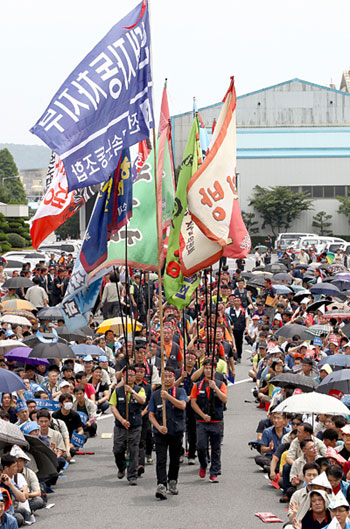

Vol. 76/No. 32 August 27, 2012

|
| Seong joon Cho/Bloomberg via Getty Images |
| Strike action at Hyundai in Ulsan, South Korea, July 13. Autoworkers are demanding higher wages, end to night shift work and permanent hiring of temporary workers. |
Workers are demanding that temporary workers be made permanent, a wage increase and an end to graveyard shifts, which workers say are a health hazard.
Workers at GM plants in South Korea are organizing similar rolling work stoppages.
Hyundai, which also owns Kia Motors Corp., is the fifth-largest automaker in the world. Autoworkers in South Korea have a long history of militant action, including going on strike against Hyundai every year from 1987 to 2008. As a result they are among the best paid workers in the country.
“Emboldened by the absence of strikes for the past three years, the company is ignoring our demands,” the Korean Metal Workers Union said in a statement.
“Autoworkers usually work 10 hours a day six days a week and they are on a different shift every week,” Hyewon Chong, director of the union’s international department, told the Militant in a phone interview. “We want an eight-hour day and to abolish the graveyard shift.”
“The union walkout is counterproductive and harms the workers and Hyundai customers, as well as the company,” Frank Ahrens, Hyundai Motor spokesperson, told the Militant via email, complaining the company had lost $640 million in production in five days.
“Hyundai didn’t make any counterproposals on wages until today,” Chong said Aug. 14. “And even the proposals on the precarious [temporary] workers is really far off. They should not be surprised we went on strike.”
In 2000 Hyundai’s factories in South Korea accounted for 92 percent of the company’s output. Today it’s less than half, as Hyundai has expanded and shifted production to Turkey, India, Russia, China, the Czech Republic and the U.S. Its first factory in Brazil will open in November.
Auto companies are increasing the hiring of temporary workers both to boost profits and weaken the unions. Temp workers account for about 25 percent of Hyundai’s workforce and are paid just 65 percent of the wage of permanent employees, Chong said. Temporary workers went on strike last November demanding permanent positions and have also held work stoppages over the last week.
Bloomberg News reported that Hyundai made profits of $49,730 per worker last year compared to Toyota’s $17,250. Prior to the strike it was on course to increase its already record profits by 12 percent this year.
“Workers reel from violent union busting,” said a July 31 article in Hankyoreh, referring to an anti-union offensive over the last several years. The South Korean daily reported that in 2010 and 2011 the bosses succeeded in replacing the Korean Metal Workers Union with pro-company locals at key workplaces, including at Valeo Electrical Systems.
At the SJM auto parts factory in Ansan, according to Hankyoreh, “hired goons violently broke up a sit-in protest after storming into the plant early in the morning on July 27.”
Mando Corporation, which makes parts for Hyundai and Kia, locked out workers July 27 and set up a new company union. Mando is now demanding that workers sign no-strike pledges before allowing them to return.
“There is speculation that Hyundai is the invisible hand behind the attacks by goons at SJM and at three Mando plants,” said Chong. “Would any employer decide on an all-out war with their workers that risks a stable supply of parts to Hyundai on their own?”
Related articles:
Caterpillar strikers say,‘We have to take a stand’
W. Virginia Steelworkers strike against concessions
Labor rally in Philadelphia protests attacks on workers
On the Picket Line
Marx: ‘Trade Unions: Their Past, Present, and Future’
Why bosses ‘go after workers so hard’
Front page (for this issue) |
Home |
Text-version home